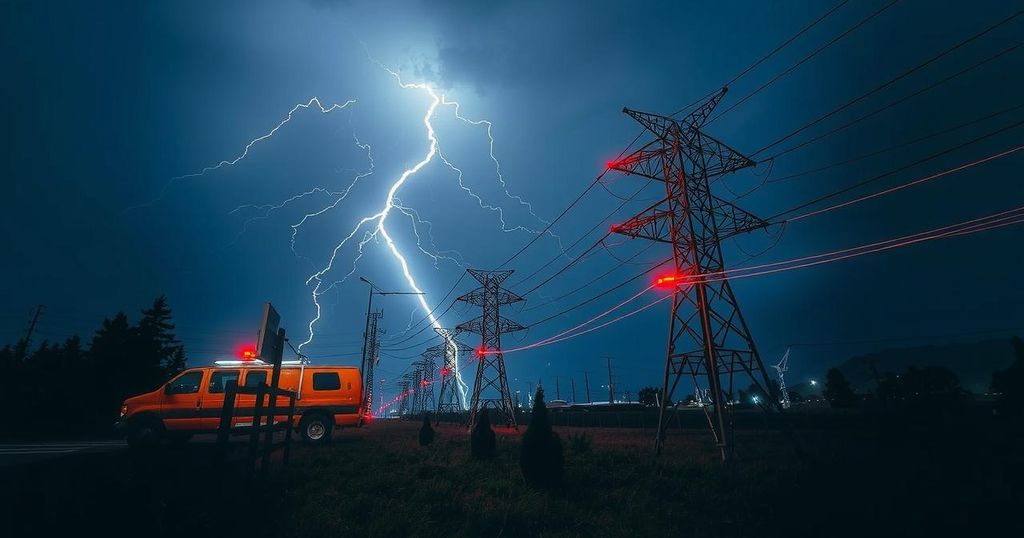Bomb Cyclone Unveils Critical Failures in Washington’s Electrical Grid
The recent bomb cyclone in Western Washington left half a million people without power, revealing serious weaknesses in the local electrical grid. The event underscored the urgent need for upgrades as utilities aim for carbon neutrality by 2045. Communication issues with utility companies hampered restoration efforts, highlighting the importance of a resilient, well-coordinated energy infrastructure. Experts advocate for increased renewable energy sources and localized storage solutions to improve reliability.
Last week’s bomb cyclone significantly disrupted power for approximately half a million residents in Western Washington, revealing critical vulnerabilities in the region’s energy infrastructure. With sustained hurricane-force winds, the cyclone toppled trees, which compromised power lines, leading to extensive outages. Utilities faced a daunting challenge in restoring service, with thousands of repairs needed across a damaged grid. This event has highlighted the urgent necessity for upgrades as Washington strives to transition to a carbon-free energy supply by 2045, mandated by state law.
Experts emphasize that the energy grid is in dire need of a comprehensive overhaul. Utilities require not only additional generating capacity and enhanced transmission lines but also sufficient workforce to maintain and repair existing infrastructure. The rising demand for electricity, particularly given the challenges posed by climate change, exacerbates these issues, as observed in the struggles of hydropower to adapt to a warming climate.
Nancy Hirsh, the executive director of the Northwest Energy Coalition, remarked on the pressing need for improvement, stating, “We have a lot of work to do.” The recent storm, while not directly linked to climate change, foreshadows the increased frequency of extreme weather events driven by climate factors, leading to heightened electricity demand that may outstrip future supply.
During the power outages, essential services such as hospitals and emergency response systems were adversely affected. Communication issues with Puget Sound Energy (PSE) further complicated efforts to manage the crisis. Local officials cited difficulties in contacting PSE, thus hindering coordination in restoration efforts. While PSE maintained that it followed established emergency protocols, the lack of timely communication raised concerns among emergency management officials.
In a parallel situation, Seattle City Light managed to significantly reduce the number of customers without power, despite operating at reduced capacity. Despite available resources, a lack of qualified personnel hindered restoration efforts. Experts advocate for increased investments in renewable energy sources and localized battery storage solutions to improve system resilience in future situations.
Ultimately, experts agree that avoiding reliance on natural gas as a fallback during outages is critical, as the ramifications could lead to more frequent severe weather fluctuations. The necessity for comprehensive reform in the energy grid cannot be overstated; the goal must be to enhance the reliability of power supply and ensure minimal disruption for the residents of Washington.
The bomb cyclone incident in Western Washington has outlined serious deficiencies in the functionality of the local electrical grid. The storm’s damage led to widespread blackouts and underscored the need for substantial improvements within the energy sector. With the mandate for carbon-free utilities by 2045 looming, experts are urging urgent adaptations in energy infrastructure. This event serves as a critical reminder that climate change can exacerbate weather patterns, heightening the demand for reliable and resilient energy systems.
The bomb cyclone’s aftermath in Western Washington has revealed the fragility of the region’s electrical grid, emphasizing the need for urgent improvements to prevent future outages. With rising demand and climate change posing new challenges, it is crucial for local utilities to enhance their capacity and improve communication during crises. The shift toward renewable energy sources, along with better infrastructure and a qualified workforce, will be essential to build a more resilient power grid.
Original Source: www.seattletimes.com




Post Comment